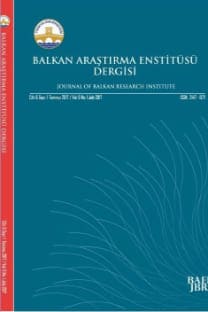BİR BALKAN TOPLULUĞU OLARAK POMAKLAR VE KİMLİK ALGILAMALARINDA TÜRKLÜK BULGULARI
Balkanlar coğrafyasında, Pomaklar kadar kimliklerini koruma adına âdeta
ateşte pişerek yeşeren bir başka topluluk yoktur. Onların kendilerini ne şekilde
algıladıklarına bakılmaksızın, yaşadıkları ülkelerde Müslümanlaştırılmış Bulgar,
Müslümanlaştırılmış Yunan, Müslümanlaştırılmış Makedon, Müslümanlaştırılmış
Sırp vb. kabul edilen ve üzerlerinde bin bir baskı, zulüm ve asimilasyon politikaları
uygulanmış olan Pomaklar, maalesef bugün de bu çağ dışı uygulamaların
girdabında çırpınmaktadır. Yaşadıkları ülkelerde Pomak, Torbeş, Goralı vb. adlarla
anılan bu topluluk, esas itibarıyla Müslümandır ve kendilerini Türk kabul ederler.
Bu sebeple, yüzyıllarla ifade edilen bir süreçte, kimliklerine dönük her türlü baskı,
işkence ve politikalara direnerek Müslüman Türk kimliğinden vazgeçmeyen,
vazgeçirilemeyen bu topluluğun tarihinde ve kültürel kodlarında Türklük
unsurlarını aramak ve bunları bilimsel ölçütlerle ortaya koymak, insani ve bilimsel
bir zorunluluktur. Algı, her şeyden önce bir birey veya toplumun birikimleri,
mensubiyet şuuru ve kültürel kimliği ile ilgili olduğuna göre, Pomak topluluklarına
bu açılardan bakmak gerekir. Pomakların kimlik algılamalarındaki Türklük
unsurları somut örneklerle ortaya konulabilirse, onların ısrarla niye “Türk” vurgusu
yaptıkları da kolayca anlaşılabilecektir. Bu çalışmada, etnik anlamda üzerlerinde
fırtınalar koparılan Pomak, Goralı, Torbeş vb. adlarla anılan topluluğun toplumsal
ve kolektif hafızası demek olan doğum, ölüm, evlilik, yemek kültürü vb. gelenek ve
göreneklerinin Türkiye ve Orta Asya Türklüğü ile olan paralelliklere dikkat
çekilecektir. Böylece, onlara atfedilen Müslümanlaştırılmış Bulgar, Yunan, Makedon
ve Sırp iddialarının ne kadar havada kaldığı görülecek, buna karşılık Türklükleri,
Türk tarih ve kültür dairesine ait oldukları görüşü güçlenecektir.
Anahtar Kelimeler:
Pomak, Goralı, Torbeş, Balkanlar, Türk, Bulgar, Bulgaristan, Yunanistan, Makedonya, Kosova, Kimlik.
POMAKS AS A BALKAN COMMUNITY AND EVIDENCE OF TURKISHNESS IN THEIR PERCEPTIONS OF IDENTITY
Many nations have been affected by this negative process, but not as much as Pomaks... Because in the geography of the Balkans, there is not any community other than Pomaks that grows by maturing in fierce conditions for the sake of protecting their identity. Pomaks, who were accepted as Islamised Bulgarian, Greek, Macedonian, Serbian etc. in their countries without looking at how they perceived themselves and were under severe pressure, cruelty and policies of assimilation, are unfortunately still grappling over these primitive practices today. This community, called as Pomak, Torbesh, Gorani etc. in the countries where they live, is Muslim in essence and it considers itself Turkish. Therefore, it is a humanistic and scientific necessity to search for elements of Turkishness in the cultural codes and history of this community which has never given up and been deterred from its Muslim‐Turkish identity by resisting all kinds of pressure, torment and policies towards their identity in a period of centuries and to put them forward with scientific criteria.Since perception is about the cultural identity, consciousness of relativity and accumulation of an individual or a community above all things, it is necessary to go over Pomak communities from these aspects. If the elements of Turkishness in the Pomaks’ perception of identity can be put forward with concrete examples, it can be easily understood why they persistently put emphasis on “Turkishness”. In this study, the analogy between customs such as birth, death, marriage, food culture etc., and the social and collective memory, of the community which has been discussed in ethnical aspects such as Pomak, Gorani, Torbesh etc. and that of Turkey & Central Asian Turkishness will be pointed out. Thus, it will be seen that claims attributed to them as “Islamized Bulgarian, Greek, Macedonian and Serbian” remain in the air, and on the contrary, the view that they belong to Turkish history and culture, and their Turkishness will grow stronger.
Keywords:
Pomaks, Gorali, Torbesh, Balkans, Turk, Bulgarian, Bulgaria, Greece, Macedonia, Kosovo, Identity.,
- ISSN: 2147-1371
- Yayın Aralığı: Yılda 2 Sayı
- Başlangıç: 2012
- Yayıncı: Trakya Üniversitesi
Sayıdaki Diğer Makaleler
BİR BALKAN TOPLULUĞU OLARAK POMAKLAR VE KİMLİK ALGILAMALARINDA TÜRKLÜK BULGULARI
İSİM SORUNU ÇERÇEVESİNDE MAKEDONYA VE YUNANİSTAN ARASINDAKİ İLİŞKİLER
Minorities in the Balkans: State Policy and Interethnic Relations (1804-2004)
Çeviride Buluşmak Yahut İki Ülke Arasındaki Köprü
Türkiye ve Arnavutluk Arasında Kültür Köprüsü, Bir Adanmışlık Öyküsü: Makbule Fatma Hanım
Barış İnşa Sürecinin Önemli Unsuru:Bosna-Hersek’te Yerlerinden Edilmişlerin Geri Dönüşü
